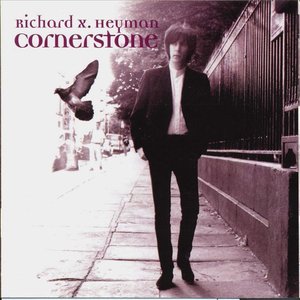Published on Jun 2, 1998
Not since Todd Rundgren first appeared on the music scene have
we seen a pop genius like Richard X. Heyman. Like Rundgren, he
writes catchy songs with thoughtful, bittersweet lyrics, and he can
play a multitude of instruments including guitar, drums, piano,
harpsicord and bass. His previous album,
Hey Man!, was a tour de force of occasionally wistful but
always melodic gems, and this new one,
Cornerstone, is even better.
It has been seven years since Heyman’s last release and in that
time, Heyman’s songwriting has matured. While
Cornerstone lacks some of the sonic twists and turns of its
predecessor, it is more focused musically and thematically. The
title song begins the album on a wistful tone as Heyman describes
returning to a town to find everything has gone away but that the
cornerstone still remains. And all of the songs that follow take a
cue from this one by looking back at the joys and failures of a
love affair. The last song “Clear To Me Now” sums up what
“Cornerstone” had intimated, and he realizes the biggest loss of
all was true love. The power of the lyrics, coupled with the
tightly contructed melodies prove Heyman to be a sort of a
power-pop poet laureate.
Like all classic pop music,
Cornerstone is influenced by pop stars of the past, starting
with Heyman’s singing voice which sounds like a cross between Ray
Davies of the Kinks and Tom Petty. Musically, there are familiar
touches from the jangly guitar sound of “If We Should Ever Meet
Again” to the Burt Bacharach feel on the midtempo piano number
“When She Arrives” to the mid-period Beatles influence on “The
Drone Song.” I also hear a little of a poppish Moody Blues running
throughout the album whether the song is uptempo like “Ask Anyone
Who’s Tried” or a gentler acoustic song like “All I Have.” But
rather than mimicing past artists, he instead creates a sound
uniquely his own by melding these different influences.
Heyman’s talent on various instruments is quite impressive. I
love his intricate harpischord playing on “When It Was Our Time”
and his classy piano playing on “Racing After You.” I also like the
way the guitars sound sort of like bagpipes on “Tidal Wave.” Heyman
plays all the instruments on four of the fourteen songs, and on the
others, he gets some good instrumental work out of Lez Warner on
drums, Andy Resnick on guitar, and his wife, Nancy Leigh, on bass.
Wow, a spouse with talent, what a concept!
What Heyman has successfully done on
Cornerstone is create an album that will appeal to power-pop
fans for his concise, catchy melodies. And since his lyrics prove
him to be quite the singer-songwriter, this album will also appeal
to folk-rock fans.
Cornerstone is the best of both worlds.
